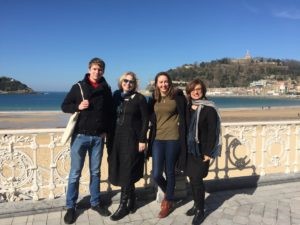Project Workshop with Dr Kathryn Lowe

On 15 and 16 February 2017 the Languages of Early Medieval Charters team was delighted to welcome Dr Kathryn Lowe from the University of Glasgow to the Basque Country for a stimulating and wide-ranging two-day workshop. Dr Lowe has been at the forefront of research on Anglo-Saxon documentary culture for over twenty years now. Dr Lowe’s expertise focuses on vernacular written records, their uses and their transmission, and her work on wills, chirographs and bounds has been particularly influential on the shaping of the Languages of Early Medieval Charters project. The team were therefore thrilled to hear about Dr Lowe’s current work on the functions and forms of Old English documents, much of which has stemmed from her editing of the Anglo-Saxon charters from Bury St Edmunds with Professor Sarah Foot of the University of Oxford. Dr Lowe guided the project team through a number of case studies, some of which contained highly unusual orthography and Old Norse-derived vocabulary, and some of which were likely to have survived thanks to multiple stages of copying. The story that this material told was two-fold. On the one hand, it attests to the fascinating social dynamics of East Anglia in the centuries immediately before and after the Norman Conquest: a place where the linguistic and cultural footprints of Scandinavian settlers could be detected in a miscellaneous body of vernacular records. At the same time, this material offers a reminder of the pitfalls of approaching documents with rigid views concerning typologies and form. Several of these pre-Conquest records are not currently included within the catalogue of Anglo-Saxon charters established by Peter Sawyer, and their value to medieval copyists has seemingly been underestimated by modern scholars, perhaps largely due to the manner in which they have survived. This was a compelling and problematizing lesson that could uniquely be taught with Dr Lowe’s philological and palaeographic expertise.
